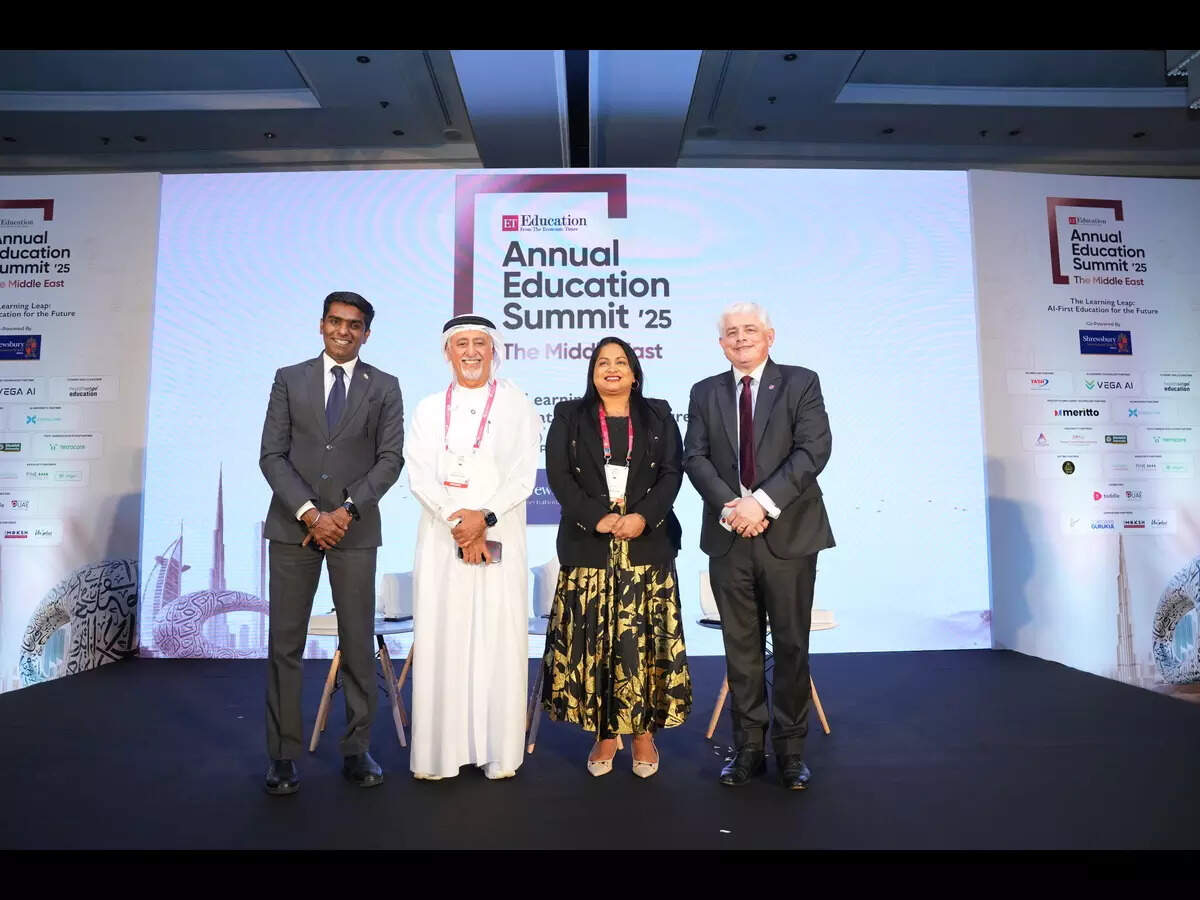

Dubai, UAE: The Economic Times Annual Education Summit – The Middle East 2025, held on 8th October at the Millennium Plaza Downtown Hotel, Dubai, successfully brought together a galaxy of education leaders, policymakers, innovators, and changemakers from across the region and beyond to chart the future of learning in an AI-driven world.
Centered around the theme “The Learning Leap: AI-First Education for the Future,” the summit became a melting pot of ideas, insights, and collaborations aimed at empowering institutions, educators, and learners to adapt and thrive in a rapidly transforming global education landscape.
The day began with an inspiring inaugural ceremony graced by His Excellency Satish Kumar Sivan, Consul General of India to Dubai and the Northern Emirates, who delivered the special address, followed by keynote speeches from Dr Eesa Mohammed Al Bastaki, President, University of Dubai, and Dominic Tomalin, Founding Headmaster, Shrewsbury International School, India. Their visionary perspectives set the tone for a day that blended policy dialogue with actionable insights on technology, innovation, and the future of education. “In the UAE—and indeed across the world—the driving force behind innovation and national success is human capital. It is the foundation upon which we build sustainable progress across society, the environment, and the economy. Ultimately, true sustainability lies in empowering humanity itself,” said Dr Eesa Mohammed Al Bastaki, President, University of Dubai.
Powerful conversations, global voices, and a packed house
The summit witnessed an overwhelming turnout of delegates representing universities, K-12 institutions, edtech enterprises, and government bodies from across the Middle East, India, and Southeast Asia. The packed sessions reflected the region’s growing commitment to position itself as a global education destination through innovation and collaboration.
The Mega Panel on Centres of Excellence: Positioning the Middle East as a Global Education Destination emerged as one of the day’s most impactful discussions, featuring thought leaders such as Prof Manda Venkatramana (Chancellor, Gulf Medical University), Prof Ammar Kaka (President, Curtin University Dubai), Assoc Prof Dr Suhaimi Ariffin (President, National University of Malaysia in Qatar), and Kunwar Shekhar Vijendra (Chancellor, Shobhit University, India). The dialogue underscored the importance of cross-border collaboration and technology-enabled excellence to drive research, innovation, and student success.
“In the age of AI, the ways we learn and practise will inevitably need to evolve. When it comes to collaboration between universities, it can take many forms — from establishing franchises, branches, or offshore campuses to setting up learning centres across regions. These are some of the meaningful ways institutions can collaborate globally and share knowledge beyond geographical boundaries,” said Assoc Prof Dr Suhaimi Ariffin, President, National University of Malaysia in Qatar.
In another highly engaging session, National Skills Frameworks for the AI Economy, leaders such as Amina Al Marzouqi (University of Sharjah), Randa Bessiso (University of Manchester – Middle East Centre), and Dr Imad Hoballah (American University of Ras Al Khaimah) explored strategies for creating agile, AI-ready workforces equipped for the evolving digital economy.
Complementing the higher education track, the School Education Track generated powerful exchanges on emerging pedagogies. Sessions like “From Rote to Real: Reimagining Learning for the AI Age,” “Teacher Training 2.0: Building AI-Confident Educators,” and “Curriculum 2.0: Teaching for a World Yet to Come” saw spirited participation from regional education leaders including Glen Radojkovich (Cognita Schools), Poonam Bhojani (Innoventures Education), Navin Valrani (Arcadia Education), and Tomas Duckling (Dubai College).
Highlighting the core thought of the discussion, “With the rapid rise of AI, the role of teachers has become more vital than ever. AI should not replace teachers but rather empower them—by automating routine and time-consuming tasks such as assessments, scheduling, and administrative work. This allows educators to focus their energy where it matters most: on nurturing students’ learning and growth. By giving teachers more time and mental space, AI enables a truly student-centric approach to education—one where innovation and meaningful learning can thrive every day,” said Poonam Bhojani, CEO, Innoventures Education.
Special segment that draws the most crowd’s attention!
A major highlight of the day was the exclusive fireside chat with actor, entrepreneur, and philanthropist Vivek Anand Oberoi, titled “Empowering the Next Generation: Education, Innovation, and the Future of Work.” In a heartfelt conversation with Yasmin Taj, Editor – ETHRWorld & ETEducation, The Economic Times, Vivek Oberoi shared his personal experiences and reflections on education as a driver of purpose and progress. His segment resonated deeply with the audience, adding a human touch to the day’s technology-focused dialogues.
“AI is transforming the educational landscape at an incredible pace. When we founded Swarrnim Innovation University in Gujarat, the vision was to create India’s first innovation-led university—one that bridged traditional degrees with the startup ecosystem. At a time when students aspiring to build startups were often discouraged from leaving formal education, we wanted to redefine that mindset. In India, a degree has long symbolised not just employability but even social credibility. Our goal was to blend academic rigour with entrepreneurial freedom,” said Vivek Anand Oberoi.
The summit concluded with the glittering ETEducation Excellence Awards Gala Ceremony, which recognised institutions and individuals who have made remarkable contributions to innovation and excellence in education. Among the distinguished winners were Curtin University Dubai (Excellence in Global Collaboration), Gulf Medical University (Outstanding Contribution to Health Sciences Education), Innoventures Education (Innovation in K-12 Learning), and Shining Star International School, Abu Dhabi (Leadership in Student-Centric Learning). The awards celebrated visionaries who are redefining the learning experience through innovation, inclusion, and impact.
A transformative platform for global collaboration
The Economic Times Annual Education Summit – The Middle East 2025 emerged as a true confluence of ideas, where academia, industry, and policy converged to shape a shared vision for the future of learning. The overwhelming participation, rich insights, and dynamic energy of the attendees reaffirmed The Economic Times’ commitment to fostering platforms that drive thought leadership, cross-border collaboration, and innovation in education.
As the curtains close on a power-packed edition in Dubai, the Economic Times Education team looks ahead to expanding this dialogue globally — continuing its mission to empower institutions, educators, and learners to embrace innovation as the cornerstone of educational transformation.






